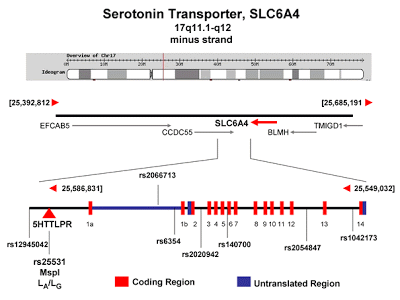Neuroscience
There never was a single "depression gene", and those patting themselves on the back because of the ceremonial defenestration of that straw man are fooling themselves.

Yes, a new meta-analysis in JAMA (Risch et al., 2009) found that a variant of the serotonin transporter gene (the 5-HTTLPR polymorphic region) is not linked to an increased risk of depression, either alone or in combination with stressful life events. This study examined 14 prior papers, including the now-maligned article by Caspi et al. (2003) in Science.

A depiction of the organization of the serotonin transporter showing the 5HTTLPR region and the positions of several SNPs. Adapted from Heils et al, 1996 and Lesch et al, 1996 by the Genotyping Lab at the University of Colorado.
Contrary to popular opinion, Caspi et al. never said that the single gene 5-HTTLPR is the "prime driver" of depression. Instead, they suggested that it moderates the effects of stressful life events on the risk of depression:
Another issue -- the importance of early life experience -- is raised by David Dobbs in The (Illusory) Rise and Fall of the "Depression Gene":
Hey oncologists: where's "the gene" for cancer? Neurologists, have you found "the gene" for Alzheimer's disease yet? No? Why not? Because they're complex multidetermined diseases. Does that mean there is no role for genetic contributions to these disorders? Of course not! Here's an editorial by Thomas (2005) in Cancer Epidemiology Biomarkers & Prevention:
Clinging to the stubborn view that there is absolutely no biological basis for depression is just as preposterous as saying that stressful life events have no influence whatsoever on one's mental health. Get over it.

References
Caspi A, Sugden K, Moffitt TE, Taylor A, Craig IW, Harrington H, McClay J, Mill J, Martin J, Braithwaite A, Poulton R. (2003). Influence of life stress on depression: moderation by a polymorphism in the 5-HTT gene. Science 301:386-9.
Risch N, Herrell R, Lehner T, Liang KY, Eaves L, Hoh J, Griem A, Kovacs M, Ott J, Merikangas KR. (2009). Interaction between the serotonin transporter gene (5-HTTLPR), stressful life events, and risk of depression: a meta-analysis. JAMA, 301 (23), 2462-2471.
Thomas DC. (2005). The need for a systematic approach to complex pathways in molecular epidemiology. Cancer Epidemiol Biomarkers Prev. 14:557-9.
- Family Fortunes
Just read an article in the New Scientist which discussed the apparent link between stress and the inheritance of psychiatric disorders such as schizophrenia and depression. A few recently published studies have shown that stress in the early life...
- Commendable Press Release From Wustl
Figure from (Pergadia et al., 2011). Click on image for a larger view. One of the more measured and accurate press releases I've seen in a while was issued by Washington University in St. Louis (WUSTL) to announce the publication of a paper (Pergadia...
- Nobel Knockout!
From the Nobel Assemble press release: The Nobel Assembly at Karolinska Institutet has today decided to award The Nobel Prize in Physiology or Medicine for 2007 jointly to Mario R. Capecchi, Martin J. Evans and Oliver Smithies for their discoveries of...
- P16-ink4a
From The New York Times: Gene Found to Switch Off Stem Cells During Aging By NICHOLAS WADE Published: September 6, 2006 Biologists have uncovered a deep link between lifespan and cancer in the form of a gene that switches off stem cells as a person ages....
- Primary Progressive Aphasia (ppa)
From an NIH press release from earlier today:Study Links Progressive Aphasia Syndrome to Prion Gene Most people with a rare type of dementia called primary progressive aphasia (PPA) have a specific combination of prion gene...
Neuroscience
Myth of the Depression Gene
There never was a single "depression gene", and those patting themselves on the back because of the ceremonial defenestration of that straw man are fooling themselves.

Yes, a new meta-analysis in JAMA (Risch et al., 2009) found that a variant of the serotonin transporter gene (the 5-HTTLPR polymorphic region) is not linked to an increased risk of depression, either alone or in combination with stressful life events. This study examined 14 prior papers, including the now-maligned article by Caspi et al. (2003) in Science.

A depiction of the organization of the serotonin transporter showing the 5HTTLPR region and the positions of several SNPs. Adapted from Heils et al, 1996 and Lesch et al, 1996 by the Genotyping Lab at the University of Colorado.
Contrary to popular opinion, Caspi et al. never said that the single gene 5-HTTLPR is the "prime driver" of depression. Instead, they suggested that it moderates the effects of stressful life events on the risk of depression:
Individuals with one or two copies of the short allele of the 5-HT T promoter polymorphism exhibited more depressive symptoms, diagnosable depression, and suicidality in relation to stressful life events than individuals homozygous for the long allele. This epidemiological study thus provides evidence of a gene-by-environment interaction, in which an individual's response to environmental insults is moderated by his or her genetic makeup.Caspi et al. (2003) also said the following:
- Evidence for an association between the short promoter variant and depression is inconclusive. Although the 5-HTT gene may not be directly associated with depression, it could moderate the serotonergic response to stress.
- Much genetic research has been guided by the assumption that genes cause diseases, but the expectation that direct paths will be found from gene to disease has not proven fruitful for complex psychiatric disorders.
- Until this study's findings are replicated, speculation about clinical implications is premature.
Another issue -- the importance of early life experience -- is raised by David Dobbs in The (Illusory) Rise and Fall of the "Depression Gene":
. . .The headlines are predictable enough, "Sad News for Depression Gene" being perhaps the funnest.But wait; not so fast. Has an empire crumbled here? A hypothesis evaporated?You need only look at this briefly, I think, to see that the question addressed by both papers is fairly limited, and does not, crucially, cover variations in how early life experiences might amplify any risk conferred by the short 5-HTT allele. (Caspi & Moffitt clearlyBut does anyone still believe that complex psychiatric disorders are caused by a single gene? I think not. The field of psychiatry genetics is littered with examples of "a gene for schizophrenia" and "the gene for bipolar disorder" that have failed to replicate. Even the most ardent proponents have become more circumspect about the search for genes that predispose one to specific mental illnesses.did not include such events in theirsexcluded such early experiences from some of their analyses, and in fact took measures in some of their measures, such as removing from analysis anyone who suffered depression before age 21, that would be likely to exclude some people who suffered particularly rough early years.. And unless I missed something in reading the Risch paper, it too makes no effort to look at early experience in particular -- and, since it pulled Caspi's data from Caspia, would reflect the same possible filtering out of such early-onset depression cases.)
Hey oncologists: where's "the gene" for cancer? Neurologists, have you found "the gene" for Alzheimer's disease yet? No? Why not? Because they're complex multidetermined diseases. Does that mean there is no role for genetic contributions to these disorders? Of course not! Here's an editorial by Thomas (2005) in Cancer Epidemiology Biomarkers & Prevention:
Thinking about biochemical pathways has become an increasingly important part of molecular epidemiology. The field is rapidly moving from evaluation of single candidate genes, one at a time, to consideration of entire pathways comprising perhaps dozens of genes and their environmental substrates, even multiple pathways that link up or compete in complex networks. Even in its simplest rendering, for example, dietary folate seems to be a protective factor for colorectal cancer and is involved in at least two distinct pathways... Many proteins critical in folate metabolism are coded for by genes with known polymorphisms. Alcohol and vitamins B6 and B12 also play a role in the folate pathway, and of course other pathways involving metabolism of heterocyclic amines, polycyclic aromatic hydrocarbons, bile acids, and nonsteroidal anti-inflammatory drugs might compete or interact with the folate pathways... To further complicate matters, there is evidence that folate may protect against early precancerous lesions but increase the risk of cancer in those with preexisting lesions.Why should it be any different for bipolar disorder and major depression? Of course a person's life experiences and their environment influence whether or not they develop depression. Given identical circumstances, some people are more likely to become depressed than others. Why is that?
Clinging to the stubborn view that there is absolutely no biological basis for depression is just as preposterous as saying that stressful life events have no influence whatsoever on one's mental health. Get over it.

References
Caspi A, Sugden K, Moffitt TE, Taylor A, Craig IW, Harrington H, McClay J, Mill J, Martin J, Braithwaite A, Poulton R. (2003). Influence of life stress on depression: moderation by a polymorphism in the 5-HTT gene. Science 301:386-9.
Risch N, Herrell R, Lehner T, Liang KY, Eaves L, Hoh J, Griem A, Kovacs M, Ott J, Merikangas KR. (2009). Interaction between the serotonin transporter gene (5-HTTLPR), stressful life events, and risk of depression: a meta-analysis. JAMA, 301 (23), 2462-2471.
Thomas DC. (2005). The need for a systematic approach to complex pathways in molecular epidemiology. Cancer Epidemiol Biomarkers Prev. 14:557-9.
- Family Fortunes
Just read an article in the New Scientist which discussed the apparent link between stress and the inheritance of psychiatric disorders such as schizophrenia and depression. A few recently published studies have shown that stress in the early life...
- Commendable Press Release From Wustl
Figure from (Pergadia et al., 2011). Click on image for a larger view. One of the more measured and accurate press releases I've seen in a while was issued by Washington University in St. Louis (WUSTL) to announce the publication of a paper (Pergadia...
- Nobel Knockout!
From the Nobel Assemble press release: The Nobel Assembly at Karolinska Institutet has today decided to award The Nobel Prize in Physiology or Medicine for 2007 jointly to Mario R. Capecchi, Martin J. Evans and Oliver Smithies for their discoveries of...
- P16-ink4a
From The New York Times: Gene Found to Switch Off Stem Cells During Aging By NICHOLAS WADE Published: September 6, 2006 Biologists have uncovered a deep link between lifespan and cancer in the form of a gene that switches off stem cells as a person ages....
- Primary Progressive Aphasia (ppa)
From an NIH press release from earlier today:Study Links Progressive Aphasia Syndrome to Prion Gene Most people with a rare type of dementia called primary progressive aphasia (PPA) have a specific combination of prion gene...
